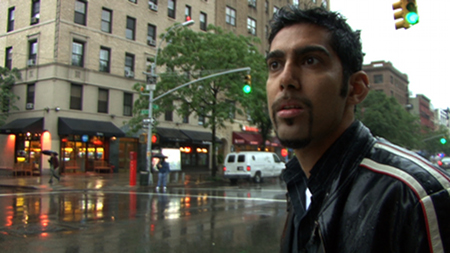Film Essent Archive for January, 2013
Sundance Review: Prince Avalanche

David Gordon Green is back in arthouse form with the lovely and effervescent Prince Avalanche, a methodically paced, gorgeously shot buddy/road trip/ghost story loosely adapted from the Icelandic film Either Way. Alvin (Paul Rudd) and Lance (Emile Hirsch) are stuck out in the middle of nowhere, living out of their tent and highway maintenance truck as they wend their way slowly down an endless ribbon of stagnant highway, methodically painting yellow line after yellow line in a hypnotic rhythm, interspersed with a staccato bang, bang, bang as they hammer metal poles with reflectors alongside the highway, marking their path as they go.
They make an odd couple. Alvin, who fancies himself to be smarter and therefore better than the rather dense Lance, studies German on audiotapes, blaring his lessons from an giant boombox as they work, while Lance complains that it’s putting him to sleep. Alvin’s self-righteously set on self-improvement and study; he’s a bookish, reclusive sort of guy, and he’s using this job at least in part, it seems, as a justified way of having space and solitude from his stagnant relationship with his girlfriend, Lance’s sister. Lance, on the other hand, aspires to neither big thoughts nor big dreams, and finds the endless stretches of quiet and loneliness, with no one but Alvin for company, to be excruciatingly dull. Lance’s tastes are simple: he likes beer, comic books, loud music, hot chicks, and “getting the little man squeezed.” He only has this job because Alvin is doing his girlfriend a favor – and perhaps because it makes Alvin feel important to be able to impart his own brand of knowledge and wisdom onto this guy he perceives to be beneath himself. With Lance, Alvin can play the role of mentor — a role, one suspects, that he otherwise has few opportunities to play.
Read the full article »
Sundance Review: When I Walk

I’m not always a big fan self-exploratory, therapeutic docs in which the filmmaker explores some aspect of their lives through cinema, but When I Walk, director Jason DaSilva’s wrenchingly autobiographic journey through the hell of his rapid physical deterioration after a diagnosis of multiple sclerosis is an exception to that rule.
DaSilva was filming a vacation trip with his family in 2006 when he collapsed to the ground and found himself unable to get up again; from that moment on his previous life of traveling the world to make documentary films would never be the same. As part of coming to terms with the new and ever-shifting “normal” that would be the rest of his life, DaSilva followed his instinct, picked up his camera, and turned it on himself. This project could have devolved into the maudlin and self-absorbed; instead DaSilva’s strength and resilience, his determination to stay positive – bolstered in part by his relentlessly positive mother, who’s prone to calling him out on any over-privileged American kid whining and reminding him constantly that we only have one life to live, and have to make the most of it – is what shines through every frame of his story.
Read the full article »













